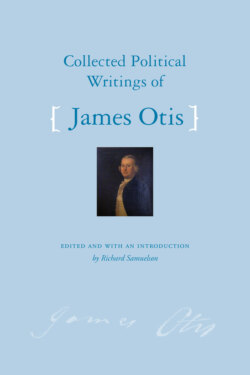Читать книгу Collected Political Writings of James Otis - Otis James - Страница 18
На сайте Литреса книга снята с продажи.
Оглавление[print edition page 20]
[print edition page 21]
PART 2
Otis in Massachusetts Politics, 1761–63
[print edition page 22]
[print edition page 23]
BETWEEN 1761 and 1763 Otis wrote several essays on political subjects other than writs of assistance. The bulk of the newspaper essays reprinted in this section have to do with Otis’s argument with Thomas Hutchinson over currency. Otis was a bimetallist; Hutchinson was not. In these arguments the ever-present problem in the colonies of a lack of specie merged with the ongoing political arguments of late-colonial Boston. We also reproduce here two pieces on the agency question, probably from Otis’s pen.
The second main subject of the essays is Otis himself. Otis’s opponents charged that his political actions grew from one source: animosity toward Thomas Hutchinson. Otis’s father, Colonel Otis, had believed that he would be appointed to the Massachusetts Superior Court. Instead, Hutchinson was appointed. Hutchinson claimed that Otis threatened to “set the Province in a Flame” if Colonel Otis did not get the post. For his part, Otis charged Hutchinson and his friends with hoarding offices.
The third subject of these essays is constitutional controversy. Otis’s constitutional concerns are present in his newspaper essays, but they are most clear in the pamphlet A Vindication of the Conduct of the House of Representatives of the Province of Massachusetts-Bay. In Vindication Otis argues that the governor may not demand that the duly elected representatives of the colony cover expenses incurred during a recess of the House—even when those expenses have to do with fitting out a ship in a time of war. Otis fears that unchecked authority in the executive will soon become arbitrary power.
These essays show the connection between provincial political controversies of the 1760s and the imperial issues that would soon arise with such force. They reflect Otis’s concern with checks and balances, with liberty under law, and with John Locke.
The newspaper essays were all published in the Boston Gazette. The Vindication of the House is rekeyed from the edition that Charles Mullett published in the University of Missouri Studies in 1929.
